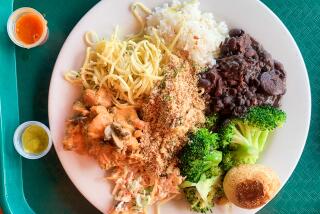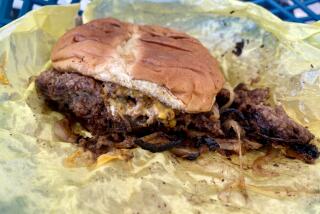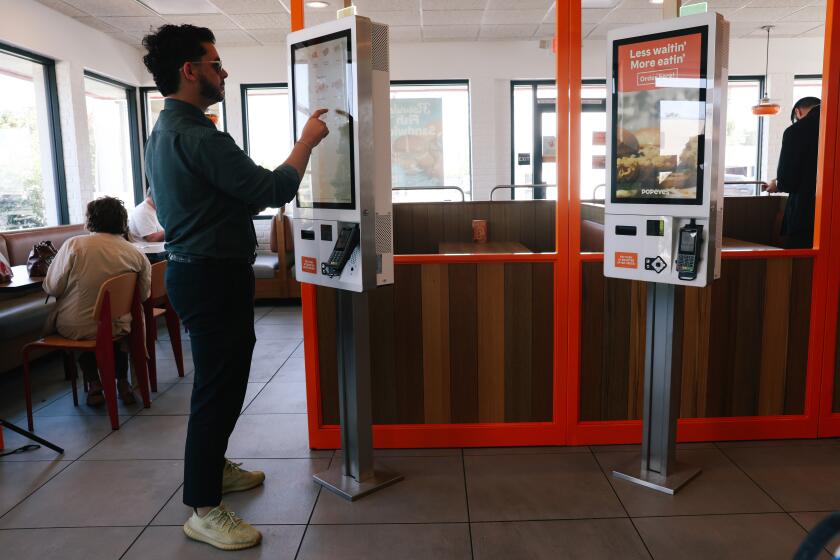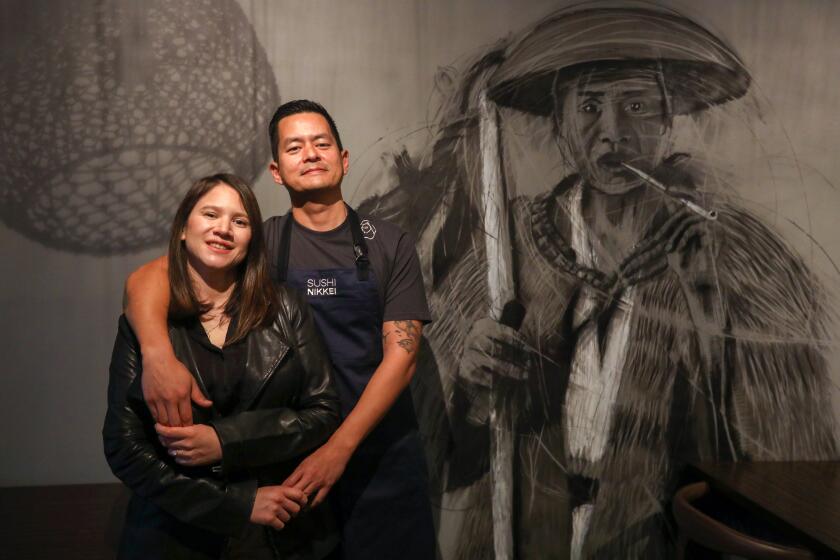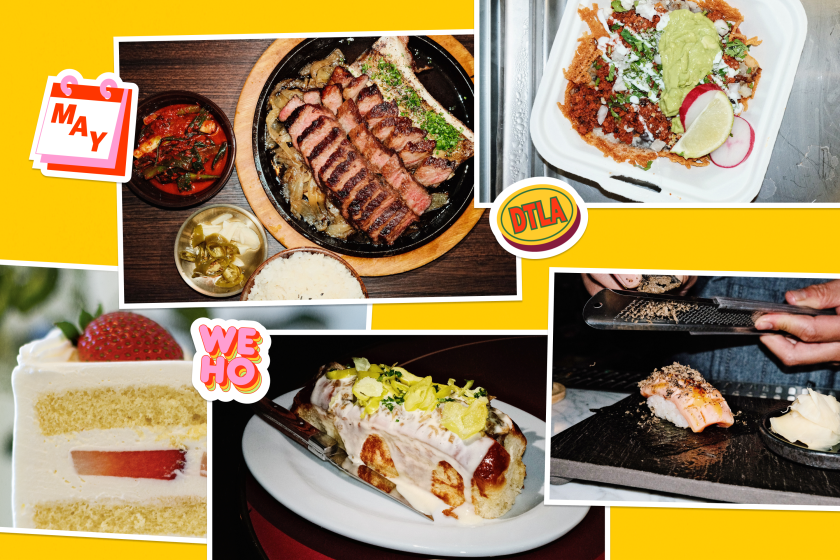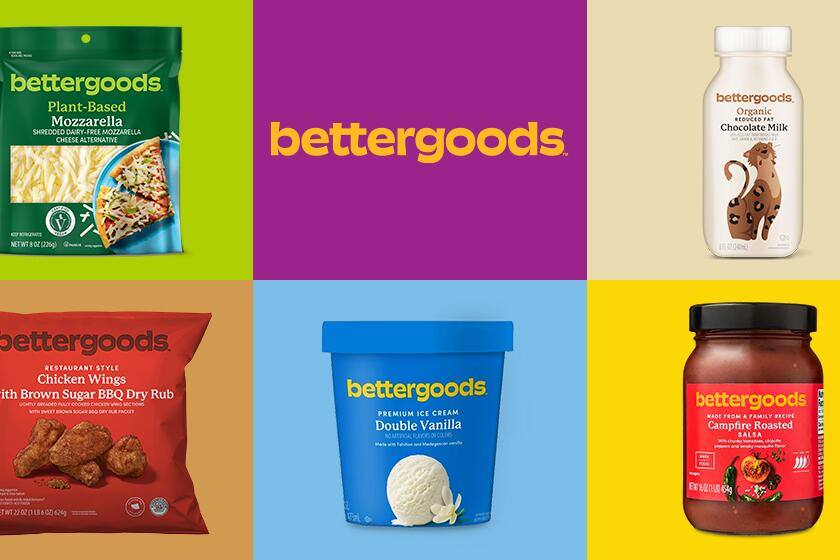Two Worlds at One Table
Shanghai Diamond Garden Restaurant will be closed until sundown today -- it’s the Sabbath, after all.
But come Sunday, the kosher Chinese restaurant in the Pico-Robertson district will be bustling as Jews gather for that culinary Christmas tradition: Kung Pao chicken, stir-fried vegetables and fortune cookies.
Jews will be pulling out the chopsticks at eateries in Chinatown and in such San Gabriel Valley Chinese enclaves as Monterey Park and Alhambra as well, following a custom that many believe started in New York in an era when Chinese restaurants were the only ones open on Christmas.
In Southern California, there may be no other place where the melding of the two cultures is more on display than at Shanghai Diamond Garden. Here, manager and Hong Kong native Wilson Chan has worked for more than a decade to build a bridge between the strict kosher eating restrictions followed by many Jews and the exacting standards of a Chinese kitchen.
Doing so meant axing some of the most popular dishes on Chinese menus: barbecued pork, garlic shrimp and stir-fried lobster.
Chan purchased the establishment at Pico Boulevard and Rexford Drive in 1995 and operated it for years as a regular Chinese restaurant. At first business was brisk.
But over the last few years, business declined. The 120-seat restaurant sits in a heavily Jewish section of Los Angeles, and Chan believed his non-kosher menu was costing him customers as the neighborhood became more orthodox.
Chan said he had to take the plunge into kosher cooking to stay in business.
So a little more than a year ago, Chan sold his restaurant to a Jewish restaurateur and stayed on to take charge of overhauling it. The woks, coated with grease from thousands of non-kosher meals, were tossed. So were all the utensils and glassware, which were replaced with new ones that were purified in a mikvah, a ritual bath that uses fresh water from a spring.
In came a full-time kosher consultant to watch over ingredients, from their arrival in the kitchen, through their cleaning, chopping and cooking. The inspector cracks as many as 500 eggs a day looking for blood spots that would render them unfit for kosher consumption.
Today, there are three deep-fryers: one for meat, one for fish and one for vegetables.
“That’s the rule,” said Chan, 53, who remains as manager. “There’s nothing I can do. We had to do it. But business is better now.”
Chan said he was shocked when he first learned how stringent kosher laws were and how much he’d have to change the business. In addition to banning the eating of pork, shellfish and a variety of other animals, the dietary laws followed by observant Jews forbid including dairy and meat products at the same meal and require that the slaughter of animals used for meat follow strict rules.
Growing up in Hong Kong, Chan was used to pork and shellfish dishes.
“My main clientele was always Jewish,” Chan said. “For Asian people, yes, those ingredients are important. But for American people, not really.”
Chan’s new boss is impressed by how quickly he has managed to operate a kosher kitchen.
“Wilson had to put a lot of effort in,” said David Askarinam, Shanghai Diamond Garden’s new owner, who helped persuade Chan to go kosher. “He had to start all over from scratch.”
Meeting the local residents’ standards is so important that Chan and his kosher compliance inspector, Yaakov Markel, reckoned they’d be more harmed by losing their kosher certification than by a poor hygiene rating from the Los Angeles County Department of Health Services.
“Even if we went from an A grade to a C, we wouldn’t lose as much business as we would if we lost this,” Markel said, fingering a framed certificate provided by a local kosher regulatory group.
But what about pork and shrimp? One could argue that a Chinese restaurant without these non-kosher ingredients is as good as an Italian restaurant without cheese and tomatoes.
Chan’s answer to the conundrum has been: “Try the crispy beef. It’s delicious.”
Although pork and shrimp are mainstays in traditional Chinese eateries, Chan argues that his chicken and beef, which are from kosher suppliers, have more flavor and are of a higher quality than anything you’d find in the San Gabriel Valley and Chinatown. Kosher laws implore cleanliness, and nothing but the freshest ingredients are accepted.
“No other Chinese restaurant cleans vegetables like we do, because you can’t have one bug in the food,” said Chan, describing the meticulous process in which produce is soaked and rubbed with salt.
“Of course I miss” pork and shrimp, Chan said. “But this is better for me. I’m getting old. I can’t have such high cholesterol. I even bought kosher beef from the market to cook at home.”
At closing time, Markel locks the refrigerators and takes the keys with him to ensure no one can contaminate the food when he’s not there. The staff -- a mishmash of immigrants from Hong Kong, Taiwan and China -- usually eats meals from the kitchen. But if they bring anything from outside, they have to eat it outside.
What’s being served can be best described as Chinese America’s greatest hits -- orange chicken, Peking duck and beef with broccoli. There’s also a Japanese touch -- a sushi bar with fresh tuna and salmon. Eel is prohibited because it lacks scales, which is a requirement for a kosher fish. California rolls are on the menu, however, because they’re made with faux crab. Chan wants a more authentic Chinese soup on the menu and is waiting for Markel to approve a chicken and ginseng consomme .
“We love this food because it’s sweet and tasty,” said Martha Kertesz, 73, of Beverly Hills after finishing a plate of orange beef. “I only eat kosher food, so I have to come here for Chinese.”
Markel believes Jews are also drawn to the restaurant and Chinese food in general because of the scarcity of dairy products. Chinese cuisine rarely exhibits the prohibited combination of meat and dairy.
Chan decorates the business with the usual Chinese water painting scenes that line the cream-colored walls. But at every archway and doorway is a mezuzah. A menorah sits on the front counter facing the exotic fish tank.
Markel has learned some Chinese phrases from the sushi chef. “I speak a little Mandarin, but I don’t speak it well,” Markel often says in Mandarin.
He has tried to teach the staff some Yiddish and Hebrew but quickly realized it could not be done.
“It’s too hard,” he said. They do have an adequate grasp of “Shalom,” however.
Chan has come to believe that Jews and Chinese share many traits.
“We’re both very family-oriented,” he said. “Many parents expect to live with their children even after they get married.”
As for the Jewish affection for Chinese food, Chan is stumped.
“We must have very similar cultures,” Chan said. “All Chinese people know that Jewish people love Chinese food. Maybe they grew up with it?”
More to Read
Eat your way across L.A.
Get our weekly Tasting Notes newsletter for reviews, news and more.
You may occasionally receive promotional content from the Los Angeles Times.
